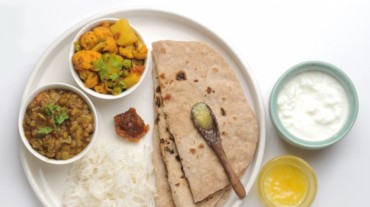
Women’s nutrition is one such aspect that requires urgent attention as it has a direct bearing on family and community health.
Adequate nutrition is primarily an issue of rights and not just utility alone. Women’s nutrition is linked to their health, education to perform better in schools and at work. If Indian women are healthy, they can contribute to the progress of their family, society, and country. Furthermore, in line with ‘Sabka Saath, Sabka Vikas, Sabka Vishwas’, women with health on their side will also be empowered with the agency to choose their life paths and contribute to India’s holistic development.

Our upbringing happens in such a way that women often eat at the end due to social norms then only they can be recognized as good wives and mothers. This stereotypical thinking also paves challenges towards addressing women nutrition. As per the latest National Family Health Survey (NFHS) data, 18.8 per cent of women of reproductive age, i.e., 32.8 million women, are undernourished with a BMI of less than 18.5 kg/m² even when they cook food for the entire family. Awareness of micronutrition, especially among women irrespective of geographical location, hinders the intake of balanced nutrition crucial for holistic well-being.
National Nutrition Monitoring Bureau data on food consumption by individual women highlights the issue of the low intake of micronutrients against the Recommended Dietary Allowance (RDA). This is exemplified by the 2012 data that reports that among girls between 16-17 years of age the nutrient intake as a percentage of the RDA is only 68 for calories, 82 for protein, 42 for calcium, 52 for iron, and 41 for vitamin A, while among adult moderate women it is 80 for calorie, 89 for protein, 62 for calcium, 69 for iron, and 42 for vitamin A.
India has high rates of malnutrition among women that undermine their productivity, resistance to diseases and capacity to generate income. In addition, food security in terms of availability, affordability, and quality and safety remain a challenge in India according to the Global Food Security Index, 2020, where the country ranks 71 out of 113 countries in this aspect.
The NFHS – 5 (2019-20) revealed that anaemia has increased to 57.2 per cent in the reproductive women age group (15 to 49 years) in most of the states as compared to 49.7 per cent in NFHS – 4 (2015-16). This paves a severe threat to human health and well-being and indicates that adequate nutrition is a critical challenge for us. Deficiencies of micronutrients such as Iron, Vitamin A, Zinc, etc., arise from inadequate intakes, impaired absorption and utilization, excessive losses, or a combination of these factors. It exacerbates during times of greater physiological need such as infancy, pregnancy, lactation, and catch-up growth following an illness.
Also Read: Listen up, ladies! These 10 women reveal why they’ve added specific nutrients to their diet

Poor nutrition habits
The diets of many households are based predominantly on cereals/grains or starchy roots and tubers, which have lower micro-nutrient content.
The Covid-19 pandemic has devastating effects on the nutrition status of vulnerable groups, especially women. The major challenge is how to save them from a nutritional crisis. Here comes the role of the supply chain of the essential food commodities. The Covid-19 pandemic disrupted the supply chain for nutrition-rich food due to lockdown, limited transport services, etc. Many women migrated to their hometowns and are struggling to earn their livelihood. When there is a struggle to deal with hunger, focusing on nutrition automatically takes the back seat.
Select Topics of your interest and let us customize your feed.
PERSONALISE NOWThe government of India’s provision of supplies through ration shops played a key role to ensure food security. Now, the focus should be on diet diversity, giving greater attention to balanced nutrient consumption.

Public awareness generation, knowledge development and nutrition education are critical among the community so that women have access to nutritious food, rich in protein, vitamins, and minerals. For India to achieve its commitment to Sustainable Development Goal 2 – ‘Zero Hunger’ and end all forms of hunger and malnutrition by 2030, the gendered aspect of nutrition access must be addressed for which increased community awareness is the first step.